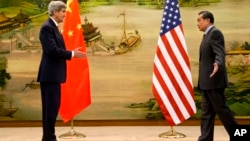The United States and China agreed Wednesday to work together to ensure that North Korea ends its nuclear-weapons program, but high-level talks in Beijing indicated the two sides disagree on whether and what sort of sanctions to use against Pyongyang following its underground nuclear test three weeks ago.
U.S. Secretary of State John Kerry, meeting with China's foreign minister in Beijing, stressed the North Korean issue is a high priority for Washington.
“The United States will take all necessary steps to protect our people and allies,” Kerry said at a news conference after his talks with his Chinese counterpart, Wang Yi.
Kerry and Wang Yi met for more than five hours Wednesday - much longer than scheduled. Wang said China supports a new U.N. resolution opposing Pyongyang’s nuclear program, and will discuss possible sanctions. However, he added, any international action against the North should not provoke new tensions.
Kerry called for strong and united U.N. action against North Korea's nuclear tests, and noted, "this is a threat the United States must take extremely seriously."
He noted that Iran, which does not have nuclear weapons, has been the target of more sanctions than North Korea has been, despite its defiance of international condemnation of its nuclear activities.
“We don’t want to heighten security tensions,” Kerry said, "but we won't talk away from any options." He apparently was referring to possible deployment of a missile-defense system in South Korea. The South's president, Park Geun-hye, said after North Korea's nuclear test three weeks ago that she would consider accepting the U.S. defense system.
WATCH: Kerry Meets with Xi in Beijing
Meeting with Xi
After his firm talk about North Korea and sanctions, Kerry met later Wednesday with President Xi Jinping, who spoke warmly about his visit to the United States last year.
Speaking through an interpreter in the Great Hall of the People, the Chinese president said: "Generally speaking, when China and the United States work together we can make good things happen ... for both sides, and that contributes to peace, prosperity and stability in the world."
"The Chinese side is prepared to work with the U.S. side" on many issues, Xi said, "and I am prepared to work with President [Barack] Obama to make efforts to advance a new model of major-country relationship between China and the United States, based on no conflict and no confrontation, 'win-win' cooperation and mutual respect.“
Kerry left China later for a return flight to the United States, heading for Washington via a refueling stop in Alaska.
China-North Korea relationship
On the question of China's relationship with North Korea, analysts say Beijing sometimes appears hesitant to impose additional penalties on Pyongyang, because of the two countries' competing interests.
"For China, the challenge is balancing the need to punish North Korea with their concerns about stability in North Korea. So, they want to push but they don't want to push too hard," said Scott Snyder, a Korean studies analyst at the Council on Foreign Relations.
U.S. Deputy Secretary of State Tony Blinken, who traveled to Asia ahead of Kerry, has been discussing the North Korean situation with his Japanese and South Korean counterparts.
Blinken said they stand firmly united "in strongly condemning this test, and in our determination, to impose costs for the DPRK's (Democratic People's Republic of Korea) flaunting of its international obligations."
South China Sea
In addition to North Korea, Kerry and Wang said they also discussed the thorny issue of competing territorial claims in the South China Sea. Regional tensions have flared recently over the overlapping claims of China and its Asia-Pacific neighbors, including Taiwan, Vietnam and the Philippines. The latest incident to aggravate the dispute came when China tested a runway on one of its artificial islands in the sea - structures Chinese crews created by dredging enough material onto tidal reefs to erect permanent structures.
Kerry flew to Beijing Tuesday from Cambodia, where he held meetings on human rights issues and bilateral trade possibilities. He also visited Laos earlier this week.








